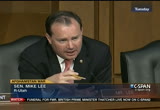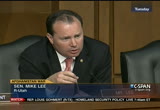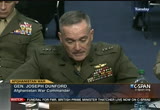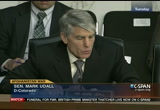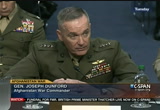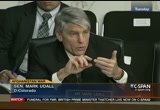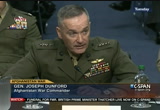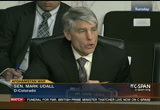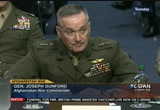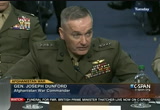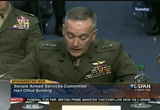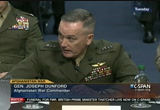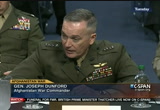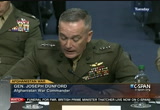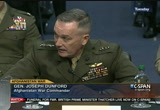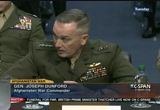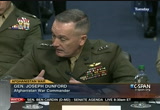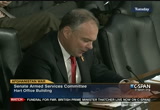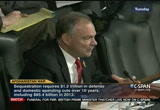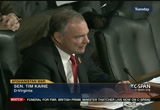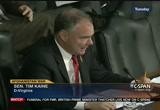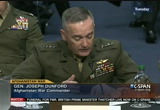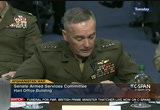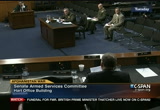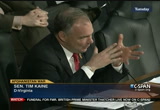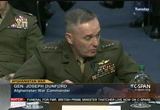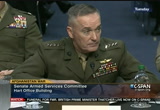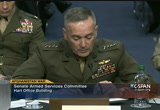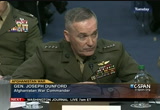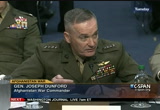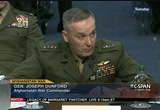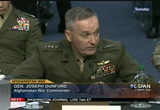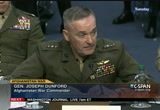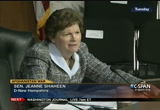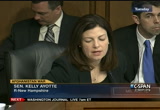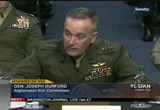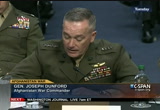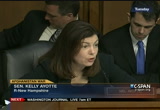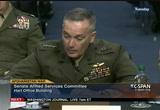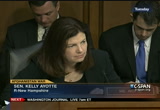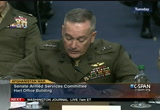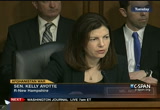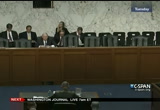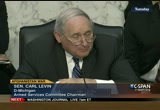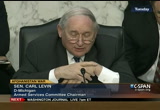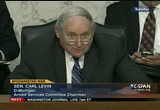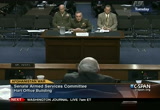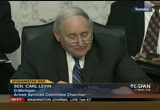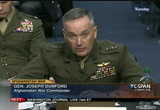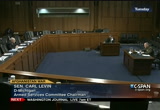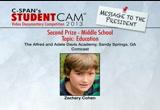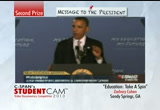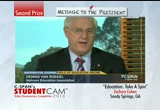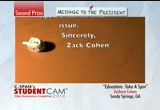tv Capitol Hill Hearings CSPAN April 17, 2013 6:00am-7:00am EDT
6:00 am
whatever it takes to continue that relationship. are you saying pavement of that size and of that nature are what is going to be required in the long run? -- payment? >> it's in our best interest to continue to develop the pakistani army to ensure they can effectively deal with security in their borders. i would not say every single program we have in place right now is one we are assisting in the future. that's not something i particular attention to right now in my current duties. but i am adamant we ought to maintain a close relationship with pakistan and help them develop the resources to be able to provide security. >> your fear is we would cut them off the relationship would not exist? >> i don't believe that they can deal with that particular
6:01 am
threat without external support. >> thank you. >> we agreed it would be difficult to overstate the importance of those elections. in your assessment, what needs to happen between now and april of 2014 to make sure the elections are not only free and fair but recognize to be free and fair by the afghan public? >> the first precondition for successful elections is the security. earlier, summer of 2013 is very important. we need to emerge from this summer with security in those areas that are important to the
6:02 am
elections. we need to emerge from this summer with a perception of securities of people want to participate in the elections. one of the things that will determine if they are viewed as free elections is that they are inclusive. we need to make sure people have access to the polling stations in april. from security, that is important. the minister -- the ministry of interior has a handle on this. we will provide any support the afghan national security or is this need to provide to make sure the elections are successful. >> let me move to the afghan local police. we talked about their role and you talked about how the talibye most significant issues the taliban will have to address. you still hold that view? to what extent does alp need to
6:03 am
be funded and manned at all levels and is it a sustainable an initiative as we drawdown our coalition troops? >> i continue to believe the alp is critical to our success. it is an important component of our success. 21,000 of the alp today. the minister of interior has requested to grow that figure to 45,000. reviewasked my staff to that in june and july this year to insure that we don't look at the alp other than the full context of afghan security forces. i am a big believer in the acting local police initiative which is critical for security
6:04 am
post-2014 and i believe it is sustainable. it has afghan ownership right now. the afghans are identifying the areas where they want alp to be established. >> i don't think you can overstate the utility of local ownership. let me know to the heavy responsibility you have and that is you preparing for this fighting season and you are planning for troop reductions. in your opening statement, you mentioned a range of capabilities and units that the afghan security forces currently lacks. in that light, would you recommend that aviation assets and dod support be provided by our military after 2014? on a related note, will u.s. civilian agencies be able to
6:05 am
sustain their current levels of personnel and assistance without having a route -- a robust nato military force in place? >> there are certain capability gaps and you highlighted the most important ones for the most important one would be close air support. i recommend we would provide close air support to the afghans post 2014. we have seen recently where the absence of that has created difficulties for afghan forces the we will not address capabilities until 2015 or so. that is the program of records so there will be a gap between 2014 and the full operational capability of the afghan air force. when that exists, i would recommend we provide that support. i mentioned we should be in the four corners of the afghanistan post-2014.
6:06 am
it is not only to provide the right level to abies and assessed but also to support the u.s. government enter agency. -- inter agency. i understand what the requirements are for an embassy perspective. not ask you to answer this question as to president karzai's response about support and we should consider what his reaction will be to the continuation of support moving forward. i would make that comment. let me turn to sequestration. "about the troops that will
6:07 am
rotate into that theater now and beyond? >> from my perspective, i have been told that sequestration will not affect the resources we have available to our men and women on the ground inside afghanistan and i believe that. my greatest concern is that it will impact the retinas of the units at home preparing to deploy to have to get a stand. one of the great success stories over the last 10 years has been the quality of training and equipping of our men and women in uniform. is no comparison to what training was earlier in my career as a result of the support of congress and leadership and learning lessons over the last 10 years. i think it is important we sustain that same high level of training in the coming years because we will still have people in harm's way. >> let me move back to the taliban and the threats they present but also the opportunity for the afghan government and for us.
6:08 am
thatnk we share a concern the taliban could be viewed by the public as the best arbitrator of resolutions. they would be tempted to turn to the taliban and their courts to reserve their problems. providing an alternative. i believe dispute resolution is a core function of sub-national governments. this is a critical area where
6:09 am
the afghans have to improve for our success to be sustainable in the future. there is no question about it. >> thank you for your service and making belong to appear from theater. -- the long trip here from theater center blunt. microphone. >> i almost turned it on. thank you general for spending time with us today. i want to follow up on senator graham's comments of the attention of somebody we capture, a third country national. my impression is that there is no plan as to what to do with them in the future. >> we don't have a decision on what to do with them in the future. in fact, next week, we have a team led by the secretary of defense to work through this
6:10 am
issue. this is not a new issue. i don't have the decision about the disposition of those the detainee's as we approach 2014. >> what would be the risk of not agreeing to a plan for these detainees? >> these people have to be kept behind bars. i don't know what the legal framework would be. an afghans have moved to evidence-based process for detention operations and will use a conflict from work. i'm not sure the afghan process would allow us to keep those third country natch -- nationals detained beyond 2014. we would have to look at that
6:11 am
closely. >> thank you. mentioned 350,000 afghan forces which would not be the police force but the other forces? >> that is the aggregate of the police and the army left the afghan local police. three of 52,000 with the afghan uniformed police, the army, the border police and over that number, right now, is the afghan local police which are approved for a level of 30,000. >> how big a problem does attrition continued to be? >> it is a significant challenge. we have nearly 30% of attrition. it is at or about the goal of 16%. the local police is low. the army is the area where attrition is of greatest concern. >> is of highest as you get closer to the fighting season? >> we have not seen a direct correlation between the fighting
6:12 am
season and the attrition. we have between leadership and attrition. what size force would you contemplate us leaving? what size forced do we have to leave to get people and equipment out successfully and secondly, what size force should we hope that the afghanis and maintain and sustain? equipment,ard to there are three aspects. there is the retrograde of equipment that would come back to the united states. the other is based) material reduction. the equipment that is needed to reset our forces, we will get that out by the end of 2014. we will still be closing out bases and reducing materials, returning the ground the way we found it post-2014.
6:13 am
currently, the size of that element is 2500 soldiers that help us with that. i expect we will need some similar organization post 2014 called cent-com - it is a logistics unit that works from central command. i think we now are looking at 352,004 is being sustained through 2018 as the best recommendation. >> what level of help will the afghanis be from outside the sustained force that big? >> in accordance with the chicago conference, they will need through 2018, the vast majority of the money necessary to sustain that force which will come from the united states and international partners. >> the vast majority? >> of about $5 billion to sustain that force. the afghans will pay
6:14 am
approximately 500 million. the potters of the resources andssary to sustain after resources posed as 2014 with "international community and the united states. >> on removing our people from afghanistan, at what point do the people who are there face real danger and how many people do we need to leave their to safely get the other people out? >> we will make that decision based on the security environment and based on the capability and capacity of the afghans who will serve -- supply the security when we draw down. ask 10never going to soldiers to do more than 10 soldiers were the work and we will shrink the perimeter figure in afghanistan the kids force protection first and foremost about. >> on facilities, you mentioned
6:15 am
returning the situation back to the way it was before the facility was built. do we have a process we go through with the afghanis to decided they would like things re are of no value? >> we have a detailed plan for afghan infrastructure to sustain afghan forces post-2014. some of that is being transitioned from coalition forces to afghans. all the infrastructure above their ability to sustain over time, we have a detailed plan that links the infrastructure the afghans will maintain post- 2014 with the resources we project will be available to sustain that infrastructure and we want to make sure there's a balance between the projected resources and the numbers of facilities the afghans keep. those facilities that cannot be sustained are the ones i talked about that we would reduce back to the way we found them. militarygo just be on
6:16 am
use of those facilities to hospitals and schools or other uses? do we have a checklist like that? >> we do, that is led by the afghan government, the minister of finance. local governments want to have the infrastructure. they would submit a request to the minister of finance who will to determine the sustainability and he would come to us with a request for a specific piece of infrastructure to be maintained you have had a tough assignment and looks like it will not get easier and i wish you well thank you for what you do for us. >> q, senator. >> senator kaine. >> thank you for appearing before us today and i want to ask about a couple items starting with budget questions. there have been a number about sequester. i did a tour of langley air
6:17 am
force base a couple of weeks back and talk about this issue of the war fighter being protected. i was surprised to find that many of the military personnel had maintained the f-22's not defined as the war fighters. the budgetary issues are affecting their ability to maintain aircraft. that is a factor that leads to the step down a readiness of some of the f-22 units. 60,000 folks under your command in afghanistan, while the were fighters may be protected, how does the sequester and other budgetary challenges impinge upon your mission. i think about things like the retrograding of equipment. is that something that is viewed as a core war fighting mission? is the subject to some of these budgetary reductions? >> all the functions we are
6:18 am
performing inside afghanistan including retrograde are war fighting mission. i have been assured by the secretary of defense that there will not be an adverse impact in those areas. i think you highlighted a important point. atts that are at room -- are home -- it is difficult to say we will properly researched those units that are next to deploy and not support those who are next to deploy. it is not that claim. as restart to see degradation, there is no doubt that degradation of retinas will affect units to be deployed and those currently deployed. >> on the retrograde question, there may have been a question asked before, talk about the current status of the relationship with pakistan as it affects retrograding equipment out of afghanistan. >> we just completed about two thehs of research to move
6:19 am
equipment out of pakistan to the port of karachi. largely clear the backlog. we have successfully completed those in principle so over the next 45-60 days, we will maximize the movement across ground lines into pakistan. at this point, it is moving in the right direction after a long time with those ground line communications. we are in a good place. >> you had a good colloquy with senator lee about pakistan and many members of the committee and senators look at certain actions of the pakistani government with concern. we understandme, that pakistan has lost many people in the fighting.
6:20 am
as any of our allies. you did not go too deeply into the question of the nuclear arsenal in pakistan from a security standpoint. things wee of the have to worry about, and on stable pakistan with a nuclear arsenal? we need to continue to work with them to what degree we can as partners for the ultimate security of that nuclear arsenal. >> i believe we have a common cause with pakistan is in that regard. they increase in the recognize the threat of extremism. we certainly have been dealing with that for some years. to the extent we can have an effective relationship in dealing with that extremist threat, i think pakistan's
6:21 am
increased cooperation will be appreciated. >> you talked about the use of drone . i would like to go deeper into that question. there is a strong military rationale we have been able to use drones that have provided a significant advantage in weitary missions and yet weigh the effect of the drone program on the civilian populations in pakistan and afghanistan. talk to us about the current state of affairs of afghanistan in terms of our program affects the civilian populations. leads toher it additional violence against our troops. vehiclesloy unmanned in afghanistan and have the same standard for proportionality and discrimination with those as we do with main vehicles.
6:22 am
mitigation and civilian casualties is no different whether there is a pilot in the cockpit or not. apply force in afghanistan, we ensure we have positive identification of targets and identify individuals with hostile intent and we do a clear assessment of the collateral damage that might be associated with this particular strike. i am proud of our forces over the last 18 months in terms of all we have done to mitigate the risk of civilian casualties. i don't think there's a direct relationship between a tool and collateral damage or civilian casualties. i think it is the deployment of battle that is most important. we are employing those tools and with that mitigates the risk of civilian casualties. >> even beyond civilian casualties -- i have a high degree of confidence that you are deploying the tool in that way to minimize collateral damage and civilian casualties -- how about the civilian perception and the attitudes that the drone program brings
6:23 am
about even if we are doing it perfectly. this to make our challenge more difficult down the road. what is your perception of the afghan civilian population understanding of the program? >> inside of afghanistan i am not detected any concern by the average civilian over those vehicles. i think that is because of the way we deploy them. the taliban are very concerned about the vehicles and they talk about them all the time. >> let me move to another issue about the presidential elections. post-2014 is designed to address two conflicting issues. first, that we're not an occupying force and trying to meet those goals is challenging. what you think our recent announcements in this country about post-2014 levels, what
6:24 am
effect they likely to have and the outcome of the 2014 presidential elections. >> the message of vases and occupier will not come up as -- after the afghan elections. the afghan people will spouse -- will see afghan security forces providing security. i don't believe this will resonate in 2013 as the afghans take the lead. with regard to the message of abandonment -- the bilateral security agreement is a commitment post-2014. is necessary is that the united states and the international community can be a credible and consistent and comprehensive message of commitment post-2014.
6:25 am
together with that commitment and the afghans in the league, the message of vases and occupier and a message of us abandoning the afghan people gets undermined. the message of us as an occupier and the message of us the benning the afghan people gets undermined. the messaging we're talking about is very important. a strong narrative of the amendment and a strong narrative of afghans credible and in the lead of providing security i believe is a critical component to the success of the elections in 2014. >> thank you. >> senator shaheen. >> thank you very much for your service and for taking on this very challenging job that such a critical time. to furthero back discussion about the relationship between afghanistan and pakistan.
6:26 am
i agree with your view that it is critical and whatever we can do to help smooth that relationship and really foster it is very important. president karzai has repeatedly accused islamabad of trying to undermine the peace process between afghanistan and the taliban. does his accusation have any substance? can you update us on whether or not there is actually a reconciliation process under way? >> i don't know if there's any credibility to president karzai's statement about pakistan undermining the peace process with the taliban. the state department is working
6:27 am
hard and the president has identified local reconciliation as one of his top priorities. there is an office being opened in doha and we are waiting for the taliban to meet their end of the bargain to move the process ahead. i'm not engaged in that on a routine basis. my job is to set the conditions that would facilitate reconciliation, the conditions on the ground. as far as his comments, they merely highlight the deep mistrust that currently exists and has historically existed between pakistan and afghanistan. theur efforts to bring military to military perspective, if we can bring that relationship together, just like our nation and the two military to military engagements, that can be the foundation of some deeper relationship that would take
6:28 am
years to develop. i believe that military to military relationship bilateral between afghanistan and pakistan needs to be one of our objectives. that is one of the components that is critical to winning is affecting a construct a bilateral relationship between afghanistan and pakistan. issues so the tactical along the border don't have a negative impact. >> one of the areas of tension has been that border. when i was there in 2011, we saw that very directly. one of the things you talk about in your testimony is the effort to improve the coordination with the datetri- parteid border standard. can you say is that has improved?
6:29 am
tel -- whatbids at is the potential to keep that going post-2014? there's a basic disagreement about where the border and who controls what along the border. >> we signed that agreement back in the fall. as a result, we have an exchange of information in the event of cross-border firing. ago, theee weeks pakistani began to do some construction on a border post. it is disputed as to where exactly that border post is and whether it is in afghan territory or pakistani territory. initially, the pakistan is brought forces to the border point because of tensions. the afghans indicated they would not stand for the border post and their forces were given the authority to use force in the event it was necessary. parteid to the tri-
6:30 am
process to bring together senior leadership as recently as yesterday. e-escalate the d situation. this particular case has not been resolved or the last three weeks, we have been able to manage the crisis. should migrate that two-way bilateral relationship between afghanistan and pakistan. i think it is not only possible, it is happening right now. i think the leadership of pakistan and afghanistan recognize that tactical issues must be addressed and not allowed to bleed over into strategic relationship. even president karzai has the knowledge that. he is or is support of ave mil- to-mil relationship to address these disputes. i am optimistic that we're
6:31 am
moving in the right direction. >> that is encouraging. you have talked a fair amount this morning of what our presence might look like post- 2014. can you talk about the commitment of our nato partners that 2014 and how robust might be and whether there is agreement about what the presence should look like? the defensed minister ariel in brussels and at that time, the ministers agreed they would contribute between 80-12,000 forces for post-2014. say that our coalition partners are very much looking to see what the u.s. contribution will be post-2014 before making a commitment. in many cases, our coalition partners will meet u.s. air and naval support before they can commit.
6:32 am
that means specifically casualty evacuation and medical evacuation post-2014 which they cannot provide but would need that to be in place an order for them to be committed to post- 2014. is there anything we should be doing in the lead up to 2014 to provide those thatances to folks so everybody is in agreement on what happens? >> i know the president is a celebrity now but as he makes a decision about the basic framework, he has already karzai asto president recently as january that we would be there in some significant way post-2014. as the president makes a specific decision, it will be incumbent upon all of us at all levels to engage our coalition partners to ensure that we build the same effective coalition post-2014 that we have
6:33 am
had over the past several years. it is a huge success story, the way we brought nato together to accomplish the mission inside afghanistan and it is important maintain that same level of commitment for the alliance post-2014. once theof sequencing, president makes his decision and discusses that with his counterparts in the coalition, i think we'll start to see the coalition partners make their own decisions. their ability to generate the political will post-2014 and to the budgetary planning necessary in large part rests with the u.s. decision and what our presence will be post-2014. >> thank you very much. my time is up but i should offer my condolences as a boston .ative i'm sure you share our concern yesterday looking at the boston marathon. hopefully, you did not have any
6:34 am
family members affected. >> thank you, senator. >> senator ayotte. >> thank you so much for being here today and for your service to our country. we appreciate your leadership. i wanted to ask about the transfer of the deed to a naseby and to have control for the parwan detention facility and how that is going. can you also tell me if we a target or high-value target or for a national that may have intelligence that is helpful to preventing future attacks? how do we handle that situation in light of the detention transfer? >> i could talk to you about the
6:35 am
transfer. one of the last things i did before left afghanistan was 10 days after the transfer. spent about four hours on the ground with the leadership. i walked through each and every function being performed inside the facility to insure the partnership arrangement we had with the afghans protected our interests and i am satisfied right now that it does. we have good control over the detainee's and visibility and are in a position to ensure there is humane treatment being taken place inside the facility. with regard to future targets, we have a commitment by afghanistan that they will not only keep the enduring security threats we have been dean identified but also the future ones. i could talk about this in a closed forum but i am satisfied we will have appropriate access and the intelligence sharing with the afghans.
6:36 am
>> thank you, general. we can follow up on a more appropriate forum on intelligence gathering. said the enduring security thatts, those detainee's would continue to represent a threat, you are satisfied that afghans will remain control over those individuals? you and i would both want to avoid a bad situation. can you assure us how this situation is with the afghans? commitment from president karzai to present a bomb about those individuals will be detained. or afghanistan not to meet their commitment, we would have real operational policy issues to address at that particular time. i think it would change the fundamental nature of our operations and certainly change the nature of support we might
6:37 am
provide to afghanistan in the future. we have an agreement with and were they to violate that amendment, i am satisfied that would be a significant change in our relationship and the major operations. >> thank you, general. up on aboutllow this is about -- the enemy provisions. we have entered deuced legislation -- we have introduced legislation never to bargain with the enemy. this is about no traction with
6:38 am
the enemy including -- no contract in with the enemy through 2014. isis not just the dod that contracting. what other agencies are contacting in afghanistan? as you are describing the new legislation, it will be critical not only dot has contracts but the state department which has is a big role in contract in afghanistan.
6:39 am
>> anything that would keep resources out of the hands of the enemy would be a positive step. >> with the area of afghanistan, thinking about the follow on recommendations you will make to the president, how important is that we have a presence in all four regions of afghanistan? >> i think it is very important. it starts with a low level of which we should advise post- 2014. levelave six court
6:40 am
headquarters in the four corners of the country. being in the four corners of the country will help us better support the state department mission. integrated with ambassador cunningham in terms of planning for u.s. presence post-2014. i believe being in the four corners will be necessary for us to insure the gains we make with afghan forces are sustainable post-2014. and thewe look at iran role in afghanistan, speaking whaticularly post-2014, area of the country are you most worried about it and risk -- with respect to iran is force them having a presence? >> it is in the west. the harat region and we see evidence of by iranian influence. we see a great effort made by i ran to control what goes on inside afghanistan i am happy to report that many of the
6:41 am
resources have not fallen on fertile ground. they absolutely have great interest and influence in the western part of the country. a parke were not to have -- a sufficient presence in the western part of the country looking at post-2014 posture our nato allies, what type of influence do you think iran would have and what do you think they would do with that? >> i think it is fair to say that would have influence in the western part of the country and fair to say that past is prologue and that influence would be malign and the destabilizing for afghanistan. it going in terms of negotiating a bilateral security agreement? >> the next meeting is in may. the last thing i did before i left as i met with the afghan ambassador to the united states. he is the primary negotiator for
6:42 am
afghanistan. his sensehan side, was that things were moving in the right direction. he was positive we could sign the bilateral security agreement. president karzai said the same thing to me. there are difficult issues we're working for now. they are non-negotiable from the u.s. perspective. i think the team is working hard to address that now. >> thank you very much, general. we appreciate your leadership and all those who served under need you, you do an excellent job. >> thank you, senator. >> i just have a few additional questions. term say "ife and i'ved sanctuary always thought there were interchangeable but you do not. can you explain to was the difference in your vocabulary
6:43 am
between safe haven and sanctuary? >> we use the term safe haven where we cannot get to the enemy. sanctuary will use with regard to pakistan. when we talk about any safe havens, inside the force, we talk about enemy safe havens that are geographically within afghanistan and sanctuaries are those areas outside afghanistan. >> i think there is some confusion about those terms. confident that some colleagues said he used the terms interchangeably and that may have led to some of the comments this morning. -- i thought said
6:44 am
you were referring to the taliban not having a sanctuary in pakistan. i think you would agree that the taliban and does have a thetuary inside pakistan -- afghan taliban. would you agree? >> absolutely, in the exchange earlier, i thought we were talking about al qaeda. >> may have been. -- you may have been. there was some uncertainty and my staff also felt -- and not talking about your, unnecessarily -- but in the exchange, there was some uncertainty as to what was being referred to in afghanistan. it is clear there is a sanctuary for the afghan taliban inside pakistan. is that correct? >> there is no doubt and there
6:45 am
is the pakistani taliban moving in some cases freely in the eastern corner of the afghanistan back into pakistan. probably in the future, it would be wise for you to pin that down and talk to the members of congress because i have heard this repeatedly used interchangeably. i would point to myself but not to others. it is used by many colleagues interchangeably and it surely as by myself. i will try to be more accurate in the future particularly when i talk to one of our military leaders. and the common, ordinary sense of the word, there has not been the distinction and you should be aware of that if i am accurate. >> i will do that. >> secondly, i want to ask you for thee timetable
6:46 am
decision as to the number of troops that would be there after 2014. i think maybe all of us agree we need to have a credible commitment and the earlier the better. that is important. there is uncertainty that exists in afghanistan and that means to be removed in the eyes of the people, the government that clearly wants an ongoing presence and that that is credible. it is important that taliban understands that will be an ongoing credible commitment. from the united states. youo the specific number, have not made a statement as to how many that would be and you indicated today there are a number of factors which could affect your judgment as to what the proper number or range would be. am i right? >> yes, senator.
6:47 am
issue, however -- and you have spoken on this -- in your mind in making a recommendation, it is essential that there be a bilateral security agreements that protect whatever number of troops we have better their. in other words, on the sovereignty issue, we are very careful about protecting our troops that are in a foreign country so if it is not appropriate subject to the judicial arm of other countries, if we don't think it is appropriate for that to be the case, under what circumstances will an american soldier or marin or what ever be subject to foreign jurisdiction? we are very protective of our troops, is that correct? >> that is absolutely correct.
6:48 am
>> data set out in a bilateral security agreement. >> that's exactly right. in other countries, it is the status of forces agreement and that is a subset of the bilateral security agreement. ,> what ever commitment is made in your judgment, should be outitional upon a working of a bilateral security agreement? >> absolutely, chairman. any security post-2014 would be within the framework of a bilateral security agreement. if the un mandate expires in 2014, our presence post-2014 would be based on the bilateral agreement we make with the afghan government. dependedly would it be on that authority but my point
6:49 am
is that what ever number we have could only be committed to if we have a bilateral security agreement. we need a bilateral security agreement for troops that are left there after 2014. >> that's exactly right theme whether it is 8000 or 10,000 or 12,000 ourhatever the number is, share of the total number of troops, that would only be accomplished if, in fact, there is a bilateral security agreement between our two countries? >> that's correct >> we all thank you very much for your service. you have done a superb job there. superb number a of commanders that have preceded you. you are carrying out a very impressive tradition and we commend you for it and think you
6:50 am
for it and those who work with you. >> thank you, chairman. >> and we will stand adjourned. [captioning performed by national captioning institute] [captions copyright national cable satellite corp. 2013] >> the 2013 congressional directory is your guide to the current congress. that has updated listings for each member of the house and senate and contact information. aboutis information cabinet members, supreme court justices, and the nation's governors. order yours on line. fromis documentary comes the academy in sandy springs, georgia. his message looks of funding for education. it is the second prize winning video in this year's
6:51 am
competition. a jewishis a dreidel, spinning top. we can either pick up what false or leave it there. what is the most important issue? is it the economy? or foreign affairs? what about health care programs? those are all very important issues but done to think if there is one central issue that can solve all our other problems, we should tackle it first? you may be thinking what should this be? it is simple. what then can give the kids the knowledge they need to solve all these other problems? it is education. if we can well-educate our current generation from toddlers to young adults and they have
6:52 am
the tools they need to tackle all of these major problems -- >> public school education in this country has taken a back seat to other concerns. abelieve that hurts us as nation. one of the things that has made us so competitive throughout the years passed this the fact that we have had public school education, compulsory public school education. many countries do not invest in that. it is an investment in our future. >> we invest so much into the system but sometimes outcomes are not what we would like. american u.s.n educational system that is failing grossly. there's an issue of states' rights or is it a national issue?
6:53 am
in georgia, we consistently lagged behind. congress can do a better job of issuing national standards. however, our current idea of national standards are outdated and no longer serve a global integrated google. -- goal. we should get away from the idea of teaching to the test. i think we would have a greater pool of applicants in the global work force. we'll be innovators >> nobody gets to write your destiny but you. your future is in your hands. your life is what you make of it. nothing, absolutely nothing, is beyond your reach. >> mr. president, here is whwhee i disagree with you. nothing is beyond your reach but when school systems are in rough
6:54 am
shape and education standards are not up to par, it takes a large tall and you will not live up to your full potential. here are a few examples of how budget cuts affect schools. a janitor andler, nurses hours are cut and class sizes are larger and less graduates can go to college. the sad part about all of this is these things keep getting worse. >> for every 100 9th graders, only 70 will graduate from high school 44 will go on to college. enroll inudents will a second year of college and only 21 will graduate from a four-year institution in a six- year period of time. that is simply not good enough to keep the united states competitive in our global economy. >> these margins are simply
6:55 am
there are a couple of reasons why they are so bad. some of the curriculum is boring and puts kids to sleep. bad home environment can be a big distraction. cuts is probably the worst problem of all. schedule >> cause that will take place unless congress and what does that means 8.2% cut. >> cut, cut, cut. >> tyes, cuts and these cuts are not just dollars sons. their children's futures. >> federal programs are designed to pick up the slack for the kids whose needs and not being met weather is special education, english language learners, kids of my good workers -- those programs are designed to deliver needs to children's that were not being
6:56 am
met by a larger system. this will have an incredible impact from cuts. >> before we fix the educational system, we need to find out what needs fixing. >> there's probably a whole lot more that is going well with the education system than is not going well. we have room for improvement. is area where we are weak allowing students the opportunity to be creative in their learning and for us to define relevance. with the advent of technology, students don't necessarily need teachers or information because they can go to the internet. what they do need teachers for is what information is relevant or accurate and how i use that information. >> four things that can make or break our educational system are
6:57 am
-- creativity, relevance, technology, and teachers. without these, the educational system is worth less. >> people are not bombing the houses in this economy and taxes are not coming in -- people are not owning the house is in this economy and taxes are not coming in. they end up cutting things that we think are extras like the arts and physical education and they resource teachers that may be essential to being successful. >> and for some kids, education resource teachers are all they have. >> balick to read and write. >> -- i like to read and write.
6:58 am
>> mr. president, if you cut our funds, i will not be able to learn properly and my teacher will be in jeopardy. president, every day, there are millions of kids struggling. i need help, mr. president. >> mr. president, i need your help, mr. president, i need your help. >> mr. president i need your help. >> dear mr. president, they need your help. take us to the next level. quality education is a major issue in america and it must be addressed. it is spinning out of control over the future of american students and their contribution to society rests in your hands. congratulations >> to all the winners in this year's student camp competition. to see more winning videos, go to studentscam.org.
6:59 am
>> janet napolitano is on capitol hill this morning to testify about her department's budget requests. our live coverage is on c-span 3 at 10:00 a.m. eastern. today's moments, headlines, your calls and tweets live on "washington journal." there is legislative business before the house starting at 10:00 a.m. eastern. and thel vote at known debate will continue tomorrow. minutes, we will talk with the judiciary committee member about homeland security policy in the aftermath of the bombings in boston. at 8:30 eastern, we'll discuss the legislative agenda in the senate
112 Views
IN COLLECTIONS
CSPAN Television Archive
Television Archive  Television Archive News Search Service
Television Archive News Search Service 
Uploaded by TV Archive on

 Live Music Archive
Live Music Archive Librivox Free Audio
Librivox Free Audio Metropolitan Museum
Metropolitan Museum Cleveland Museum of Art
Cleveland Museum of Art Internet Arcade
Internet Arcade Console Living Room
Console Living Room Books to Borrow
Books to Borrow Open Library
Open Library TV News
TV News Understanding 9/11
Understanding 9/11